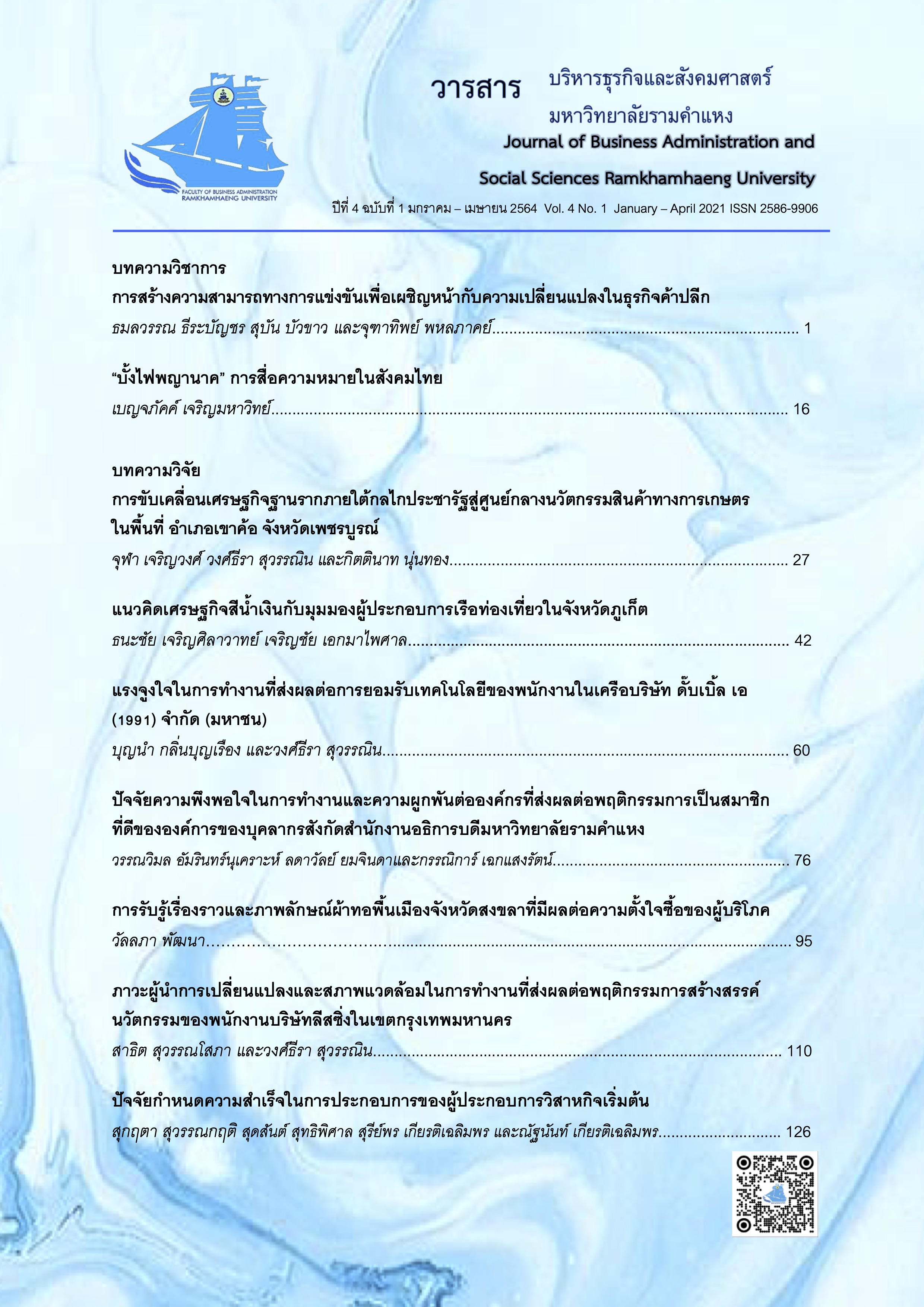Competitiveness Building to Confront Retail Business Transformation
Main Article Content
Abstract
Competition is inevitable in the business world. One of the factors that will lead to success in competition is that a business is able to confront or manage any transformation that occurs. Therefore, in this article the researchers have the following objectives: to study 1) the driving factors for retail business transformation; to analyze 2) retail business transformation; and to propose 3) guidelines to build competitiveness to manage transformation. Findings are as follows: 1) The driving factors for retail business transformation are from emerging market growth, especially from Asian countries. Consumers’ needs are more complex and different. Consumers have a lower tolerance for waiting and expect to have a fast response. Retail business tends to spend more on the development of distribution channels in the form of retail stores. An adaptation is in the use of modern technology to reduce weaknesses. 2) The analysis shows that retail business transformation has led to a fragmented market. Competition is in speed and in a modernized retail business. 3) Guidelines to increase competitiveness can be easily conducted by using personalized marketing. This is to confront retail business fragmentation, to facilitate the entire shopping process to confront competition with speed, and to turn the store front into a modern space and to provide experience to confront the transformation of the modern retail business era.
Article Details
เนื้อหาและข้อมูลในบทความที่ลงตีพิมพ์ในวารสารบริหารธุรกิจและสังคมศาสตร์ มหาวิทยาลัยรามคำแหง ถือเป็นข้อคิดเห็นและความรับผิดชอบของผู้เขียนบทความโดยตรง ซึ่งกองบรรณาธิการไม่จำเป็นต้องเห็นด้วย หรือร่วมรับผิดชอบใดๆ
บทความ ข้อมูล เนื้อหา รูปภาพ ฯลฯ ที่ได้รับการตีพิมพ์ในวารสารบริหารธุรกิจและสังคมศาสตร์ มหาวิทยาลัยรามคำแหง ถือเป็นลิขสิทธิ์ของวารสารบริหารธุรกิจและสังคมศาสตร์ มหาวิทยาลัยรามคำแหง หากบุคคลหรือหน่วยงานใดต้องการนำบทความทั้งหมดหรือส่วนหนึ่งส่วนใดไปเผยแพร่ต่อ หรือเพื่อกระทำการใดๆ จะต้องได้รับอนุญาตเป็นลายลักษณ์อักษรจากวารสารบริหารธุรกิจและสังคมศาสตร์ มหาวิทยาลัยรามคำแหง ก่อนเท่านั้น
References
Chatterjee, I. (2010). The decade ahead: Trends that will shape the consumer goods industry. London: Mckinsey & Company.
Chuprina, R. (2019). Artificial Intelligence for Retail and Marketing in 2019. Research Gate, 278(1874), 135-168.
Cognizant. (2018). Retail’s Next Frontier. United States of America: Cognizant.
Dabija, D. (2018). Generation X versus Millennials communication behavior on social media when purchasing food versus tourist services. Economies a Management, 13(1), 191-205.
Dekimpe, M. (2019). Using technology to bring online convenience to offline shopping. United States of America: SpringerLink.
GWI. (2017). Personalized Marketing. New York: GlobalWebIndex.
Techsauce. (2020). เทรนด์การตลาดใหม่ ในยุค New Normal. สืบค้นเมื่อ 19 กุมภาพันธ์ 2564, จาก https://techsauce.co/tech-and-biz/new-marketing-trend-in-the-new-normal-era
Tkaczyk, J. (2018). Digital Consumer: Trends and Challenges. Research Gate, 158(2754), 95-121
Yarrow, K. (2018). Decoding the New Consumer Mind. United States of America: Jossey-Bass.


